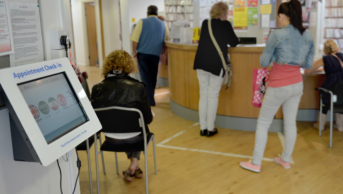
Shutterstock.com
More than a quarter of pharmacy graduates who took the summer 2019 preregistration assessment did not pass.
Figures from the General Pharmaceutical Council (GPhC) show that the summer 2019 pass rate of 72.3% was the lowest it has been since 2011. However, among any statistical comparisons and analysis, it can be easy to forget the meaning of these numbers in human terms: that 814 students, who had completed their MPharm and at least one year of preregistration training, did not qualify as pharmacists.
The data from the pharmacy regulator show that some of these students have a better chance of passing their final assessment than others. For the past few years, a handful of pharmacy schools have consistently appeared at the top of the league table for graduate pass rates in the pharmacy preregistration exam, while the same poor performing universities end up at the bottom (see Box).
Following publication of the June 2019 assessment results; the GPhC announced that it would visit the worst performing schools to discuss their pass rates, and it was due to report back at its December 2019 council meeting. But no report was published.
The regulator last met with schools with lower pass rates in 2017 and, since the 2019 results, has noted that “the group of schools with comparatively low cohort pass rates has not changed significantly in the last few years”.
“While there can be several factors affecting individual performance, including the experience in the preregistration year, we do believe this requires further investigation,” it added.
But what is behind these figures? And what needs to change to create a more equal playing field?
Box: University league table of June preregistration exam pass rates
2019
Top
UCL 93%
Bath 91%
Sunderland 90%
Bottom
Central Lancashire 47%
Wolverhampton 48%
Brighton 52%
2015
Top
Bath 90%
Nottingham 88%
Robert Gordon, Manchester, Cardiff, Kings College London 86%
Bottom
Wolverhampton 54%
Brighton, Bradford 63%
Kingston 67%
Central Lancashire 68%
June pass rates by sector
2019
Hospital 93%
Community 68%
2015
Hospital 91%
Community 71%
Source: General Pharmaceutical Council papers
As well as the variation among pharmacy school graduates, the GPhC figures show that preregistration pharmacists training in the hospital sector consistently achieve better preregistration assessment results than those trained in community pharmacy. In June 2019, the pass rate among hospital-trained candidates was 93.2%, compared with 68.2% of candidates trained in community pharmacy.
However, many pharmacy education professionals urge caution at drawing conclusions from a set of statistics they describe as “incomplete”, and place some of the blame for the inconsistencies at the door of the GPhC.
Nigel Ratcliffe, immediate past chairman of the Pharmacy Schools Council (PhSC), says: “Is it the universities’ fault that people are missing the [assessment exam] threshold or is it due to the quality of the preregistration training they are receiving? The GPhC is very keen to say it’s the universities. But it’s the universities which prepare people to go out into their preregistration year, and it’s the regulator who regulates the tutors.”
Exam results are only part of the picture
Meanwhile, Helga Mangion, policy manager at the National Pharmacy Association, argues that exam results are only part of the picture: “I think you have to be careful how you interpret these figures. Some will do better in exams than others [but] what about their portfolio, their experience?” She accepts more graduates will opt to complete their training in hospital rather than in community, but adds: “I think it’s worth trying to understand the reasons behind that.”
The variation in results
More comprehensive statistics would help determine the reasons for such variation in pass rates across the sectors and universities. In its response to the GPhC’s consultation on reforming initial pharmacy education and training, which launched in January 2019, the Royal Pharmaceutical Society (RPS) called on the GPhC to collect data that looks at the correlation between A-level grades and available preregistration exam pass rates.
“It’s easy to make assumptions, but we don’t have a clear understanding of what’s going on,” says Helen Chang, head of professional development at the RPS.
Chang’s view is shared by Andy Thompson, chair of the PhSC’s admissions group.
“The figures from the GPhC only refer to the June [2019] exam sittings and don’t take into account those students who re-sit the exam,” he says. “Although that may not make much difference to the overall picture; there are some universities that are quite bitter about that.”
Thompson, who is also deputy head of the pharmacy and pharmacology department at the University of Bath – which is consistently at the top of the league table – adds: “While that additional data may not make much difference to Bath; for other universities it could be quite significant.”
Around 60% of the University of Bath’s best graduates train in hospitals during their preregistration year, says Thompson. “They see hospital [pharmacy] as a more clinical career with fixed progression. Most are striving to become independent prescribers and see hospital [pharmacy] as a route to that. There is also a lot of interest in the GP role and to do that, they need to become independent prescribers which the hospital will fund.”
Thompson believes Bath graduates’ assessment exam results are partly down to the quality of the students it recruits at A-level, but he adds: “Having said that; some schools do not take particularly good students, but get a good percentage through.”
Rhys Llewellyn, public relations officer for the British Pharmaceutical Students’ Association, is also keen to point out that entry grades are not the only driver for final assessment success.
“Sunderland, for example, has a good pass rate despite having lower entry requirements,” he says.
It is the collective responsibility of everyone, including students
“We want to maintain academically rigorous courses, but pharmacy is equally about people skills, time management, emotional intelligence and many other skills beyond just having a good memory.
“It is the collective responsibility of everyone, including us as students. We should ask ourselves if there is any way we can be working differently,” he adds.
Improving performance
The University of Bath’s results are in sharp contrast to the pass rates of University of Central Lancashire (UCLAN) graduates, which have been among the lowest in the country for the past four years. But UCLAN now hopes to move up the ladder by offering its preregistration graduates online resources, practice papers and a smart phone app; it has also redesigned its MPharm.
“We are confident that attainment levels will improve in the future,” says Cathy Jackson, executive dean of the faculty of clinical and biomedical sciences at UCLAN.
Kingston University, which has also found itself towards the bottom of the preregistration league table in recent years, is similarly hopeful at the prospect of turning things around.
Its academic staff have “been working hard” to understand the reasons behind its drop in preregistration assessment exam results since 2016 – a time that coincided with changes to the structure of the assessment introduced by the GPhC – according to a Kingston University statement.
Staff have considered how its course is assessed, reviewed its admissions criteria and put a limit on the number of modules students can repeat.
Calculations, synoptic tests and objective structured clinical examinations have now been written into the course; students’ progress is closely monitored and there is a more “practical, hands-on approach to learning and assessment.” Personal tutors are also now expected to identify where students need additional support with emphasis on encouraging independent thinking.
And a new advisory group of graduates, current students and chief pharmacists from across the sectors has been established to help ensure its graduates have the right skills for their preregistration placement.
“The university is confident these changes will result in improvements to its preregistration assessment performance,” a statement from Kingston University says. “The full impact will not, however, be completely clear until the cohort which completed its first year in 2018/2019 sits its preregistration assessment.”
The GPhC is equally confident that its “significant” proposed reforms of pharmacy initial education and training standards, could have a noticeable impact on the current assessment exam trends. The regulator’s proposals to integrate five-year training and education for pharmacy students are planned for launch in September 2020.
Providers will have to assess the professional skills and attributes of prospective students, as well as their academic qualifications
Mark Voce, director of education and standards at the GPhC, says: “It is essential to have a more coherent and coordinated approach … to achieve a greater focus on clinical skills, on communicating with patients, and on working effectively with other [healthcare] professionals.”
He adds: “We [also] propose to strengthen the current selection and admission standard. Providers will have to assess the professional skills and attributes of prospective students, as well as their academic qualifications. We expect that this change would help to select students and trainees with the necessary skills and abilities much earlier in the process.”
Reforming the MPharm
Changes to the MPharm are also being introduced in Wales, and Scotland, which are both introducing five-year degrees from 2020.
Wales is keeping the preregistration year but changing its content, whereby pharmacy graduates in Wales will spend their preregistration year with rotational four-month placements in hospital, the community and primary care. All will have NHS employee status with a £25,000 salary.
Alex White was a member of the working parties that designed the Welsh model. He is also a lecturer and examinations officer at the school of pharmacy and pharmaceutical sciences at Cardiff University, where the preregistration exam pass rate is consistently one of the highest in the UK.
White said: “We decided against a five-year integrated degree and instead wanted to add value to the preregistration year; it had some failings and we wanted to introduce more structure and quality.”
He accepts that economies of scale in Wales make it easier to introduce such wide-ranging reforms, but adds: “We know England is watching – they are a long way behind us but there is no reason why they can’t do this as well.”


